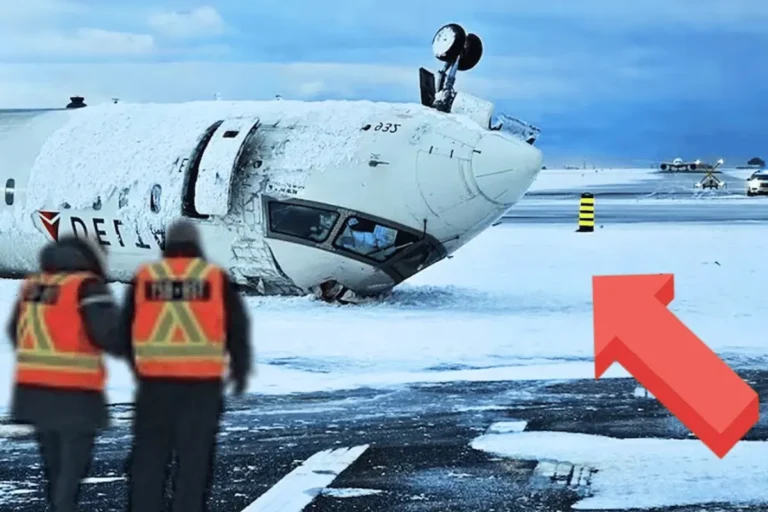“I thought I wasn’t going to make it. One second we were descending, the next—everything flipped. Literally.” That’s how Alex, a survivor of Delta Airlines Flight 4819, described the scariest day of his life. Delta Airlines stunned everyone by offering $30,000 to each survivor—no strings attached.
But is $30,000 enough to mend the physical scars and emotional trauma? Let’s unpack what happened, how Delta responded, and what this means for aviation safety moving forward.
So, What Actually Happened?
A Normal Flight—Until It Wasn’t
Delta Flight 4819 from Minneapolis to Toronto was supposed to be a routine trip. Passengers were scrolling through their playlists, sipping ginger ale, and browsing in-flight magazines. But as the plane approached Toronto Pearson International Airport on February 17, 2025, nature had other plans.
Strong crosswinds, gusting up to 35 knots, hit hard. The pilot tried the “crab maneuver”—a tricky move to stabilize landings in crosswinds. Unfortunately, it didn’t go as planned. The right wing struck the runway, flipping the entire aircraft upside down.
Cue gasps from everyone watching the news.
The Science Bit—But Keep It Simple
Think of it like trying to balance a pizza box in the wind. One side gives way, and—boom—it’s upside down. That’s basically what happened. Physics 101: uneven lift plus wild crosswinds equals a flipping disaster.
The Human Side: Eyewitness Moments
“We skidded, then flipped—it felt like slow motion but terrifying,” Alex said. Smoke filled the cabin. The smell of jet fuel. Chaos. Panic. Yet somehow, everyone got out alive.
Delta’s $30,000 Offer: Generosity or PR Move?
Wait, $30,000 for Real?
Delta’s decision to offer $30,000 per passenger with no legal strings attached surprised everyone. Typically, airlines wait for lawsuits. But not this time. Online searches around aviation accident compensation and passenger rights after plane crash are surging for a reason.
Survivors React: Grateful or Skeptical?
“It’s a nice gesture, but I still get nightmares,” said another survivor. Emotional trauma doesn’t come with a price tag. For some, the check was comforting. For others, it barely scratched the surface.
Interestingly, experts suggest that Delta’s preemptive payout may prevent lengthy litigation and PR fallout. But skeptics wonder: Is this just a PR move to protect the “airline brand reputation”?
How Quick Thinking Saved Lives
Flight Attendants: The Real MVPs
Within minutes, all passengers were out. Shoutout to the flight attendants who followed “emergency evacuation procedures” flawlessly. Heroes? Absolutely. Their swift actions likely saved lives.
Emergency Crews to the Rescue
Toronto’s “airport emergency response team” was on the scene in record time. The coordination between emergency services and airport staff demonstrated how “aviation safety protocols” can truly make a difference.
Behind the Scenes: The Ongoing Investigation
The Black Box Never Lies
Investigators are diving deep into the “aircraft black box data” and “cockpit voice recordings.” Was it a mechanical glitch? Pilot miscalculation? Or just bad luck? Answers are expected within the coming weeks.
Engineering Checks
Some experts are questioning potential “wing structural failures.” Regular maintenance and tough inspections might hold the answers. A comprehensive review of Delta’s fleet maintenance procedures is underway.
What This Means for Delta Airlines
Trust Issues?
Rebuilding the “airline brand reputation” is going to take work. Delta needs to prove that safety is still their top priority. Transparent communication and rigorous safety reviews will be crucial.
The Future of Flight Safety
Look out for more rigorous “pilot training for crosswind landings” and potential tweaks in “aircraft design for stability.” The lessons from this crash could spark industry-wide changes in how crosswind landings are handled.
Wrapping It Up with a Reality Check
So, Delta dished out $30,000 to every survivor. Good move? Absolutely. But let’s be real—money doesn’t erase memories. The crash of Flight 4819 serves as a powerful reminder of why “aviation safety protocols” matter. For the survivors, healing will take more than a check. But at least they have one less thing to worry about.
And hey, $30,000 isn’t a bad start.







